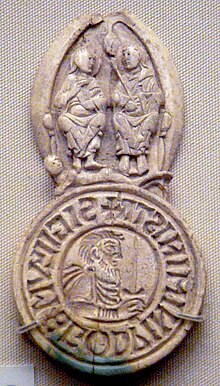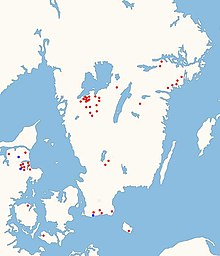Thegn
In later Anglo-Saxon England, a thegn or thane[1] (Latin minister[2]) was an aristocrat who ranked at the third level in lay society, below the king and ealdormen.Thanage refers to the tenure by which lands were held by a thane as well as the rank; an approximately equivalent modern title may be that of baron.[4] Apparently unconnected to the German and Dutch word dienen ('to serve'), H. M. Chadwick suggests "the sense of subordination must have been inherent... from the earliest time".These events would have caused famine and other societal disruptions that may have increased violence and led previously independent farmers to submit to the rule of strong lords.[15] Although their exact role is unclear, the twelve senior thegns of the hundred played a part in the development of the English system of justice.In the legal tract Geþyncðo, Archbishop Wulfstan of York (1002–1023) detailed the criteria for attaining thegnhood: "And if a ceorl prospered, that he possessed fully five hides of his own, a belhus and a burhgeat [a defensible manor house], a seat and special office in the king’s hall, then was he henceforth entitled to the rights of a thegn.Thurstan Lustwine's will, written c. 1043, left land to his cnihtes and his two chaplains (who in addition to religious duties would also have performed secretarial work).[4] During the later part of the tenth and in the eleventh centuries in Denmark and Sweden, it became common for families or comrades to raise memorial runestones.


British MuseumAnglo-Saxon EnglandealdormenThanageearly medievalScandinaviaScotlandAnglo-Saxon statusCyningEaldormanHigh-reeveThingmenhousecarlretainerVerdererVilleinCottarÞēowÆthelstanGermanH. M. ChadwickAn Anglo-Saxon DictionaryOld EnglishBeowulfGermanic peoplesAnglo-Saxonssub-Roman BritainceorlasSlavesBritonsLate Antique Little Ice AgePlague of Justinianlaw codes of KentcomitatusweregeldshillingsheriotSheriffsshire courtDavid Carpentercountry gentryhundredAethelredjury trialGeþyncðoWulfstanmanor houseMedieval householdknightchaplainsreeveshuntsmanseneschalschamberlainsEarl Leofric'sWootton WawenScandinavianrunestonesNorman conquest of EnglandWilliam the ConquerorDenmarkSwedenSö 170Vg 150DR 143DR 209DR 277AbthainTrinoda necessitasChadwick, Hector MunroCarpenter, DavidPenguin History of BritainHoldsworth, William SearleEncyclopædia BritannicaLiebermann, F.Loyn, HRMorris, MarcStubbs, WilliamWhitelock, DorothyEnglish Historical DocumentsWilliams, Ann